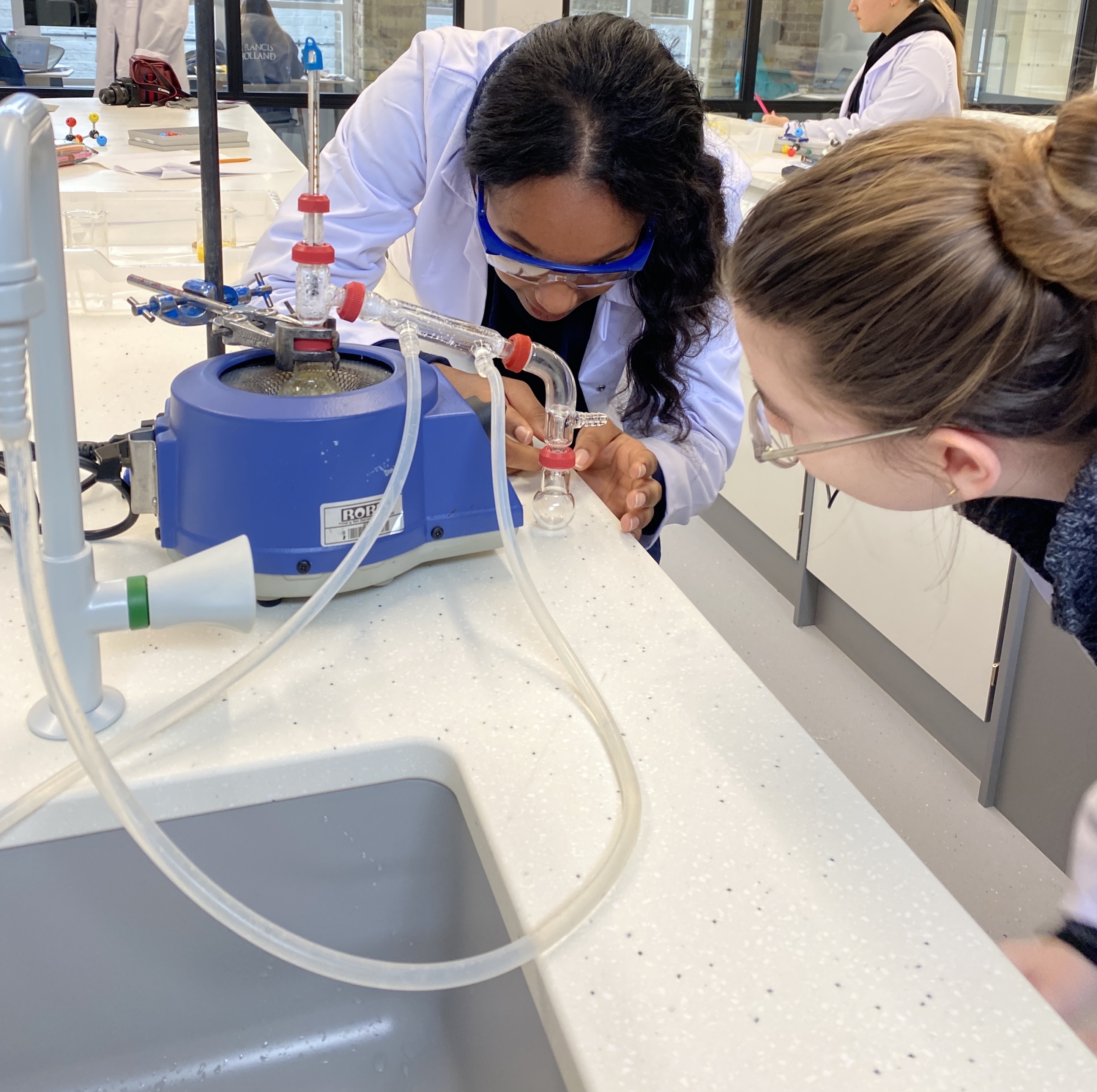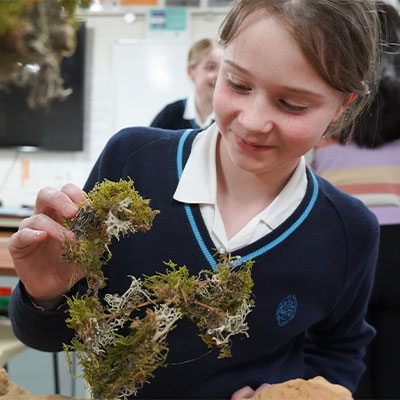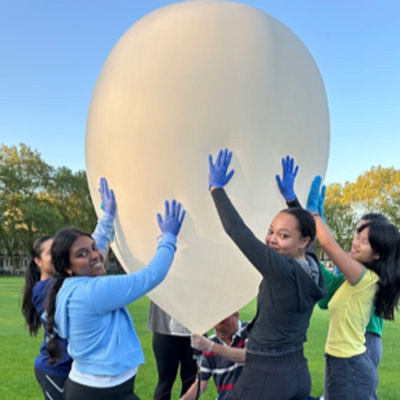Science
“Nothing in life is to be feared, it is only to be understood. Now is the time to understand more, so that we may fear less.” ― Marie Curie
In 1903, Marie Curie (1867 – 1934) became the first woman to be awarded a Nobel Prize for her contributions to physics. In 1911, she received a second Nobel Prize for her contributions to chemistry. In a time where science is our society’s focus like never before – a global pandemic, a climate change emergency – Marie Curie’s words inspire us, that as we to strive to understand more, together we can create solutions to the world’s problems.
Science at FHS is about cultivating curiosity, creative thinking and utilising evidence to provide solutions to real world problems and answers to big questions. Through their studies in Science, our pupils acquire an understanding of the key concepts of science enabling them to develop an understanding of the importance science plays in society.
Physics has no limits – everything in life, on this planet, other planets, to the far reaches of the universe is in a physicist’s job description. Physics deals with the big questions and helps us to understand why things happen and how our universe works. In our daily lives, we would be lost without physics. It has helped in the development of gadgets we take for granted and without physics, there would be no electricity supply to help things work. The world-wide-web was invented by a physicist. Recent amazing discoveries have shown that physics remains at the forefront of discovery. Massive black holes at the centre of the Milky Way, the possibility of teleportation and the recreation of the conditions shortly after the Big Bang are all currently being investigated by physicists.
Key Stage 3
In Years 7 and 8, our curriculum is designed to help every pupil to understand that they have the potential to be a future scientist! The course aims to build confidence, and to foster a love of learning. Pupils explore key core concepts such as forces, electricity, energy, light and sound through investigation and practical experimentation.
IGCSE
Year 9 marks the start of the IGCSE course, which follows the Edexcel IGCSE Physics specification. The course consists of topics that range from studying the very small, such as electrons and radioactive particles, to the very large, such as stars and galaxies that are billions of kilometres away. In between are topics such as motion, light, sound and energy in which we observe effects in the laboratory. There are opportunities to develop practical skills and to find out how physics is applicable to society.
At the end of Year 9, pupils are given the choice to study IGCSE Double Award Science, or to study three separate sciences.
Both the IGCSE Physics and IGCSE Double Award Science help to deepen an interest and enthusiasm towards science, develop a critical approach to scientific evidence and methods, and develop an understanding of how science works and its essential role in society. Both routes allow pupils to progress to study A Level Physics.
A Level
Many of the concepts that are met at IGCSE are continued into A Level Physics, including forces, energy, waves, radioactivity, electricity and magnetism. At A Level, however, pupils begin to see how these ideas work together and begin to grasp how universal principles apply to everything from the smallest atom to the largest galaxy. Physics is a very dynamic subject and many recent discoveries have changed the way we look at the universe. Quantum physics, astronomical discoveries and implications for the universe, the fundamental particles formed in accelerators, the medical applications of physics, nuclear power and relativity are all studied in A Level Physics. We follow the OCR A Level Physics course A.
A Level Physics is a highly regarded academic subject due to the development of problem-solving and practical skills that are desired by universities and many employers. Perhaps the greatest skill a physics student develops is a sense of wonder about how things work, from technology such as an X-ray machine to the dynamics of the Universe. Physics teaches us a method of systematic thinking as well as the theories to enable us to understand. For those with an ambition to be at the forefront of technologies or discovery it is necessary to study physics at school and beyond. For students with ambitions in other areas such as business management or finance the study of physics is also important even if those students don’t intend to study physics or science at university. Physics is also recommended for those interested in Medicine, Engineering, ICT, Law, Architecture and many other careers for which detailed analysis is important.
Chemistry is all around us! It’s part of our everyday lives. From the production of energy to power our society, to the treatment of water that ensures us a supply on tap, from the cosmetics we use to express our individuality, to the fabrics that we use to produce our clothing, from the food we consume, to the solutions for the climate change emergency, or the pharmaceutical drugs that support our health – chemistry has a role to play.
Through studying chemistry, pupils acquire a knowledge and understanding of chemical patterns, applying them to both familiar and novel contexts. This is a highly practical subject and our pupils are encouraged to link theoretical ideas to what they see in front of them. The subject puts emphasis on the importance of the scientific method, teaching our pupils to design, complete and evaluate experiments. Pupils develop skills and understanding that enables them to problem-solve in a wider context. At the same time, they develop virtues of craftmanship, a love of independent thinking and creativity.
Key Stage 3
In Years 7 and 8, the curriculum is designed to ensure that all pupils feel confident in the key concepts that underpin the subject having come from a range of different primary schools. There are plenty of opportunities for practical exploration with all the impressive colours, bangs and whizzes that you might expect to see in a chemistry laboratory! Pupils will learn about acids and alkalis, elements, compounds and mixtures, the Periodic Table, the Particle Model, separation techniques and much, much more!
IGCSE
Year 9 marks the start of the IGCSE course, which follows the Edexcel IGCSE Chemistry specification. This course covers a wide range of chemistry and provides a solid foundation on which pupils can confidently develop their understanding at A Level. At the end of Year 9, pupils are given the choice to study IGCSE Double Award Science, or to study three separate sciences.
Both the IGCSE Chemistry and IGCSE Double Award Science help to deepen an interest and enthusiasm towards science, develop a critical approach to scientific evidence and methods, and develop an understanding of how science works and its essential role in society. Both routes allow pupils to progress to study A Level Chemistry.
A Level
A large proportion of pupils decide to continue with their study of Chemistry at A Level, achieving most impressive results. Many of our A Level chemists then go on to study related courses at university, including: biochemistry, materials science, chemical engineering, medicine, biomedical sciences, dentistry and veterinary science. At FHS, we follow the AQA A Level Chemistry specification which offers lots of opportunity for practical work.
There are plenty of opportunities for students to get involved outside the classroom too, with competitions such as the Cambridge Chemistry Challenge and with opportunities to deliver research based presentations to their cohorts.
Biology is the fascinating study of life. In biology, we learn how our food is grown, how we eat it and what our body uses it for. We learn about how organisms reproduce and how the process of evolution by natural selection has given rise to the extraordinary variety of living organisms found on planet Earth. We learn about the components of food and what our body uses it for. We learn about the relationships between organisms within ecosystems and how those organisms may be affected by human activities. Biology encompasses many exciting and contentious issues, such as climate change, vaccination, genetic modification and cloning, and provides scientific insight into the public debate about these issues.
Key Stage 3
In Years 7 and 8, pupils are guided through core biological ideas, helping them to understand the beautiful interconnectedness of nature. The course is designed to nurture curiosity, with emphasis on developing independent study skills through practical investigation. Pupils will learn about ecosystems, reproduction, microbiology, nutrition and digestion and more.
IGCSE
Year 9 marks the start of the IGCSE course, which follows the Edexcel IGCSE Biology specification. This course gives a grounding in basic biological ideas and processes. We illustrate these processes in a range of contexts in both humans and plants. Later in the course, we consider how organisms interact with each other, including human interaction with the natural world, and consider the practical and ethical issues associated with the production of food and medicine.
The IGCSE Biology course provides a useful foundation for further study at A Level, but is also an excellent course to develop a deeper understanding of scientific issues reported in the media, particularly those concerned with health and the environment.
At the end of Year 9, pupils are given the choice to study IGCSE Double Award Science, or to study three separate sciences.
Both the IGCSE Biology and IGCSE Double Award Science help to deepen an interest and enthusiasm towards science, develop a critical approach to scientific evidence and methods, and develop an understanding of how science works and its essential role in society. Both routes allow pupils to progress to study A Level Biology.
A Level
Biology is one of the most popular A Level subjects in the country, attracting students studying a wide range of other subjects, both Sciences and Arts. Many of these students enjoy the subject so much they eventually choose a biology-related degree course such as medicine, dentistry, veterinary science, physiotherapy, pharmacy, optometry, nursing, zoology, marine biology or forensic science. Others go on to careers in law, computing, accounting or teaching. So, whatever field pupils will eventually work in, they will find biology a very rewarding and challenging course which will develop many of the skills essential for a successful career. At FHS, we follow the AQA A Level Biology specification which offers lots of opportunity for practical work.
Each year we take Year 12 students to conduct fieldwork outside of London, ensuring pupils have hands on experience of their learning. Students are also encouraged to attend the many talks and seminars being given around London, supplementing FHS’s own programme of visiting speakers, many of whom have a background in science and technology.
The Science Department is staffed by 14 specialist teachers and four technicians. We have excellent facilities and resources which enable us to deliver teaching and learning of the highest quality. The department has seven well-equipped laboratories and two preparatory rooms, all furnished to a very high standard.
The Science Department is led by Ms Norman, the Head of Science, Dr Upcott, the Head of Physics, Mrs Hameed, the Head of Chemistry, and Ms Clements, the Head of Biology.











